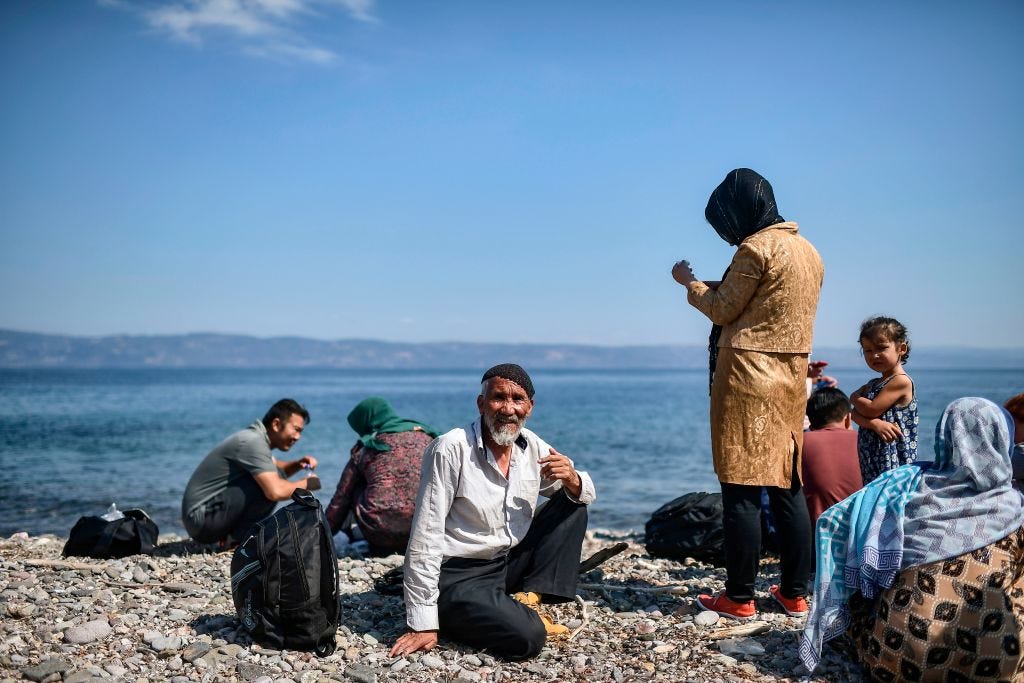The Sufferings of Immigration—1
There was no choice. I had to wait with my face red from blood and my pants wet from urine in this condition. The crowd of people of all ages, including women, men, and children, waited
By: Khan Mohammad Hedayat
In front of me was the exit door. Two or three individuals, who seemed to be locals, were standing angrily. One of them held a piece of paper and was reading off the names of people from it. Another, whose voice had been strained from shouting, was collecting money. Holding a whip, the third person stood behind the crowd, organizing and directing people into a line.
I didn’t know what our crime was or why we were here. I stood in the middle of the train, behind my father and in front of my mother. My brother, Isa, stood behind my mother. We were only about ten meters from the door, but all the people in front of us had to pass by to leave. Outside, buses were arriving in turn, slowly filling up, and leaving.
Leaving this cold and humiliating place was my only wish, not just mine, but the wish of everyone on the train—my parents’ and Isa’s as well. Leaving the door felt like being freed from prison, although the outside wasn’t much different from a prison. I understood the disarray; I knew everyone was terrified of the three men, whose bellies were so large that they struggled to carry them, and no one dared speak out of turn. But I didn’t understand why this was happening.
Why was I among these people? What had I done? I thought to myself: what was my sin if all of them had committed some sin that had brought them here to be punished? My mother, my father, Isa—none of us had done anything wrong. It was impossible. I didn’t even know where we were or where we were supposed to go after this.
I wanted to ask my father, but then I remembered the little girl in the row ahead of us, who had asked her father something a few hours ago and had cried afterward. Her father’s face had been slapped several times by the cashier as punishment. That girl was younger than me, but if I spoke, my father might face an even harsher punishment.
The reading of names was progressing very slowly. The sun had hidden behind the autumn clouds as if it didn’t want to witness our miserable state. The wind blew from all sides. I stood there, tired and desperate. After several hours, my legs started shaking from the cold and exhaustion. I felt like my heart was about to leap out of my chest and fall from my mouth. I was nauseous. I couldn’t maintain my balance. Darkness clouded my vision, my head spun, and I collapsed onto the hard, concrete ground. I lost consciousness…
I don’t know how long it was before I woke up. I felt cold drops of water on my face. My temples ached, my forehead slightly burned, and cold sweat mixed with tears streamed down my cheeks. The smell of earth and the faint scent of rain hit my senses. Slowly, I opened my eyes with great difficulty. I saw my mother quietly sobbing, trying to keep her voice down so the three men wouldn’t hear.
My frantic father was holding my head in his lap and pouring the last drops of mineral water from the bottle into his hand, then gently sprinkling it on my face. My brother, trembling, whispered, “Somayeh... Somayeh... sister..." I lifted my head slightly, then half-rose; I wanted to sit up. I realized my pants were completely soaked with urine, and that sadness only increased the coldness, making it even worse. My clothes were covered in dirt and blood. When I fell face-first onto the ground, blood flowed from my nose.
Half-rising, I tried to stand, but my father immediately helped me from under my arms and said, “Sit down, Somayeh, my daughter. Don’t stand, or you’ll faint again.” Then he spread my orange scarf on the ground and asked me to sit on it. The bleeding from my nose had stopped. But my traditional clothes and the spots on my chest and face were still stained with blood, so much so that the small spots on my shirt were no longer visible. If I weren’t so terrified of the three large men, and if it weren’t for the pain and cold, I would have screamed with all my might. I would have shouted until my voice echoed in the seventh sky. Sometimes, specific pains can only be alleviated by screaming, but alas, at that time, even that right had been taken from me. I quietly swallowed the lump in my throat.
Isa took the empty water bottle and said, “I’m going to get some water from the tap to at least wash her face.” But no sooner had he moved a few steps away from the line than the sound of a whip cracking across his back filled the air: “Where are you going? Go back to your place! Quickly!”
There was no choice. I had to wait with my face red from blood and my pants wet from urine in this condition. The crowd of people of all ages, including women, men, and children, waited. However, only the men’s names were being called, not the women’s or children’s—unless they had a male guardian. The man calling out names said:
“Ata!”
No response. He repeated it the second time, but still, no answer. The third time, he shouted in a loud, hateful voice:
“Ata!”
Someone from behind weakly responded, “Yes, sir.”
“Shut up! Come, give me your cash!”
A thin, hunched older man limped through the crowd. It was easy to guess that he couldn’t hear well. The cashier took the required amount of money and then said:
“You’ve been fined for the delay in answering your name.”
“I am deaf. My ears...”
“That’s not our problem.”
“What should I do now?”
“Add a little to your main account.”
“I have no money.”
The cashier pointed to a solitary tree about twenty meters behind the crowd and said, “Go over there.”
The poor old man walked hesitantly toward the tree. The next name was called. A tall, handsome young man walked from the front of the train to the cashier and said, “Yes, sir.” After paying the amount, the cashier, glancing at the paper in his hand, quickly looked at the young man and said:
“This is the second time you’ve come here illegally. Go stand by the tree next to the old man...”
And so it continued, with those who had been fined or had less money being separated from the rest and the others being sent into the vehicle after settling their payments.
The name caller wetted his thumb with his tongue, turned a page, and then shouted in a coarse, angry voice:
“Abdullah!”
My father jumped up and quickly pulled the money from his pocket to head toward the cashier.
“Here, sir.”
The cashier counted the money slowly, then gave my father a look of disdain and said:
“This is not enough.”
“Yes, sir, but this is all I have. It’s slightly less than the required amount. Please, I beg you. I have no more money.” Then, as he glanced at me, he continued, “My daughter is hungry...”
The cashier dismissed him coldly, saying: “Don’t make up any lies or nonsense here.” He then pointed to the tree and said, “Go there! Quickly!”







